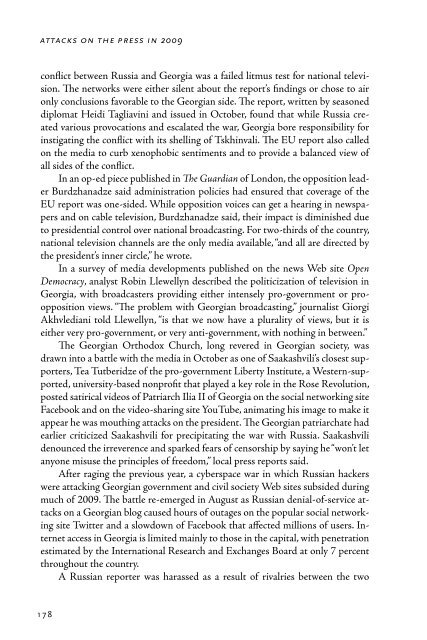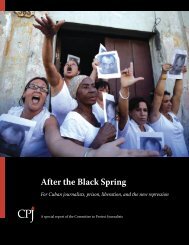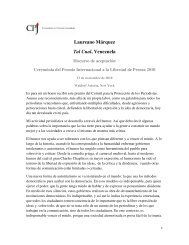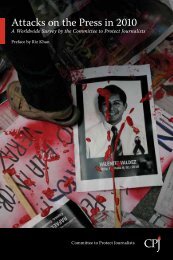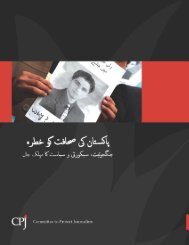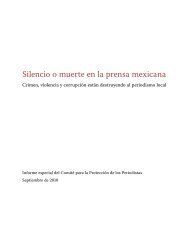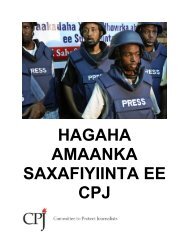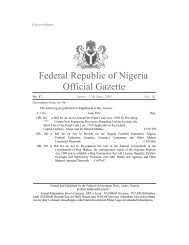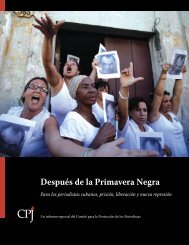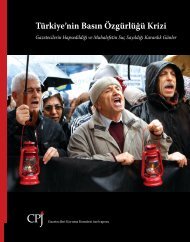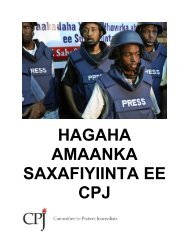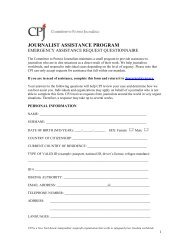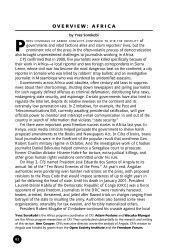Attacks on the Press - Committee to Protect Journalists
Attacks on the Press - Committee to Protect Journalists
Attacks on the Press - Committee to Protect Journalists
- No tags were found...
You also want an ePaper? Increase the reach of your titles
YUMPU automatically turns print PDFs into web optimized ePapers that Google loves.
attacks <strong>on</strong> <strong>the</strong> press in 2009europe and central asia: kazakhstanc<strong>on</strong>flict between Russia and Georgia was a failed litmus test for nati<strong>on</strong>al televisi<strong>on</strong>.The networks were ei<strong>the</strong>r silent about <strong>the</strong> report’s findings or chose <strong>to</strong> air<strong>on</strong>ly c<strong>on</strong>clusi<strong>on</strong>s favorable <strong>to</strong> <strong>the</strong> Georgian side. The report, written by seas<strong>on</strong>eddiplomat Heidi Tagliavini and issued in Oc<strong>to</strong>ber, found that while Russia createdvarious provocati<strong>on</strong>s and escalated <strong>the</strong> war, Georgia bore resp<strong>on</strong>sibility forinstigating <strong>the</strong> c<strong>on</strong>flict with its shelling of Tskhinvali. The EU report also called<strong>on</strong> <strong>the</strong> media <strong>to</strong> curb xenophobic sentiments and <strong>to</strong> provide a balanced view ofall sides of <strong>the</strong> c<strong>on</strong>flict.In an op-ed piece published in The Guardian of L<strong>on</strong>d<strong>on</strong>, <strong>the</strong> oppositi<strong>on</strong> leaderBurdzhanadze said administrati<strong>on</strong> policies had ensured that coverage of <strong>the</strong>EU report was <strong>on</strong>e-sided. While oppositi<strong>on</strong> voices can get a hearing in newspapersand <strong>on</strong> cable televisi<strong>on</strong>, Burdzhanadze said, <strong>the</strong>ir impact is diminished due<strong>to</strong> presidential c<strong>on</strong>trol over nati<strong>on</strong>al broadcasting. For two-thirds of <strong>the</strong> country,nati<strong>on</strong>al televisi<strong>on</strong> channels are <strong>the</strong> <strong>on</strong>ly media available, “and all are directed by<strong>the</strong> president’s inner circle,” he wrote.In a survey of media developments published <strong>on</strong> <strong>the</strong> news Web site OpenDemocracy, analyst Robin Llewellyn described <strong>the</strong> politicizati<strong>on</strong> of televisi<strong>on</strong> inGeorgia, with broadcasters providing ei<strong>the</strong>r intensely pro-government or prooppositi<strong>on</strong>views. “The problem with Georgian broadcasting,” journalist GiorgiAkhvlediani <strong>to</strong>ld Llewellyn, “is that we now have a plurality of views, but it isei<strong>the</strong>r very pro-government, or very anti-government, with nothing in between.”The Georgian Orthodox Church, l<strong>on</strong>g revered in Georgian society, wasdrawn in<strong>to</strong> a battle with <strong>the</strong> media in Oc<strong>to</strong>ber as <strong>on</strong>e of Saakashvili’s closest supporters,Tea Tutberidze of <strong>the</strong> pro-government Liberty Institute, a Western-supported,university-based n<strong>on</strong>profit that played a key role in <strong>the</strong> Rose Revoluti<strong>on</strong>,posted satirical videos of Patriarch Ilia II of Georgia <strong>on</strong> <strong>the</strong> social networking siteFacebook and <strong>on</strong> <strong>the</strong> video-sharing site YouTube, animating his image <strong>to</strong> make itappear he was mouthing attacks <strong>on</strong> <strong>the</strong> president. The Georgian patriarchate hadearlier criticized Saakashvili for precipitating <strong>the</strong> war with Russia. Saakashvilidenounced <strong>the</strong> irreverence and sparked fears of censorship by saying he “w<strong>on</strong>’t letany<strong>on</strong>e misuse <strong>the</strong> principles of freedom,” local press reports said.After raging <strong>the</strong> previous year, a cyberspace war in which Russian hackerswere attacking Georgian government and civil society Web sites subsided duringmuch of 2009. The battle re-emerged in August as Russian denial-of-service attacks<strong>on</strong> a Georgian blog caused hours of outages <strong>on</strong> <strong>the</strong> popular social networkingsite Twitter and a slowdown of Facebook that affected milli<strong>on</strong>s of users. Internetaccess in Georgia is limited mainly <strong>to</strong> those in <strong>the</strong> capital, with penetrati<strong>on</strong>estimated by <strong>the</strong> Internati<strong>on</strong>al Research and Exchanges Board at <strong>on</strong>ly 7 percentthroughout <strong>the</strong> country.A Russian reporter was harassed as a result of rivalries between <strong>the</strong> twocountries. On September 18, CPJ urged Georgian authorities <strong>to</strong> drop trumpedupforgery charges against Besik Pipia, Tbilisi bureau chief for <strong>the</strong> Russian newsagency RIA Novosti. RIA Novosti <strong>to</strong>ld CPJ that Pipia’s case coincided withGeorgia’s denial of entry <strong>to</strong> two Russian journalists invited <strong>to</strong> attend a publicforum <strong>on</strong> post-c<strong>on</strong>flict relati<strong>on</strong>s. After CPJ’s advocacy, <strong>the</strong> case against Pipia wasdropped.KAZAKHSTANThe authoritarian government of this central asian nati<strong>on</strong>brazenly defied internati<strong>on</strong>al standards for freedom of expressi<strong>on</strong> even as it prepared<strong>to</strong> assume chairmanship of <strong>the</strong> Organizati<strong>on</strong> for Security and Co-operati<strong>on</strong>in Europe, <strong>the</strong> Vienna-based human rights and security agency. As part of<strong>the</strong>ir bid <strong>to</strong> lead <strong>the</strong> OSCE in 2010, President Nursultan Nazarbayev and hisgovernment pledged <strong>to</strong> bring <strong>the</strong> country’s repressive media laws in<strong>to</strong> compliancewith global standards. Instead, Nazarbayev signed in<strong>to</strong> law a measure that placesexpansive new restricti<strong>on</strong>s <strong>on</strong> Internet expressi<strong>on</strong>, requires <strong>on</strong>line service providers<strong>to</strong> collect client informati<strong>on</strong> for authorities, and fur<strong>the</strong>r extends censorshiprules for all media. Authorities jailed critics and filed politicized lawsuits thatsought <strong>to</strong> shut down critical news outlets, but reported no progress in investigatingassaults <strong>on</strong> independent reporters.When <strong>the</strong> government introduced its purported media reform bill <strong>to</strong> parliament’slower chamber, <strong>the</strong> Mazhilis, in January, officials said it would facilitateinformati<strong>on</strong>-sharing <strong>on</strong> <strong>the</strong> Web and establish Internet users’ rights and obligati<strong>on</strong>s.Kuanyshbek Eskeyev, <strong>the</strong> head of Kazakhstan’s state communicati<strong>on</strong>sagency, which developed <strong>the</strong> bill, was quoted in press reports as saying that <strong>the</strong>new legislati<strong>on</strong> was aimed atprotecting Kazakh citizens’c<strong>on</strong>stituti<strong>on</strong>al rights.Local press freedom advocatescalled <strong>the</strong> legislati<strong>on</strong>drac<strong>on</strong>ian, telling CPJ that itgave authorities even greaterability <strong>to</strong> silence domesticdissent and block internati<strong>on</strong>alcriticism. Althoughlawmakers allowed independentmedia experts <strong>to</strong> submitsuggesti<strong>on</strong>s, few such ideast o p developments»»Repressive media law takes effect, setslimits <strong>on</strong>line.»»Politicized lawsuits threatenindependent newspapers.2010key statisticYear that Kazakhstanassumes chairmanshipof OSCE.178179


